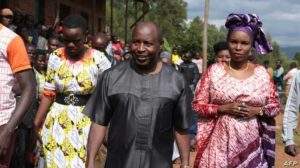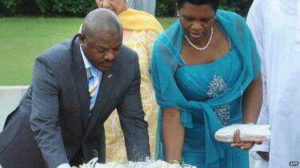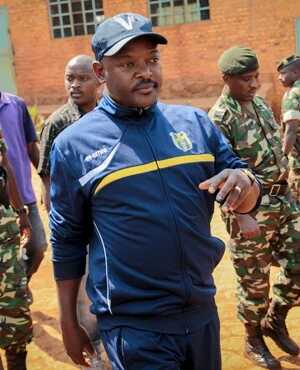Burundi’s president of over a decade, has died of cardiac arrest, according official source.
A communique issued on Tuesday June 9, 2020 by the Secretary General and Government Spokesperson, Prosper Ntahorwamiye, said he was admitted to Karuzi hospital on Saturday June 6 after a malaise. His condition improved but on Monday, he suffered a cardiac arrest and efforts of medical team to revive him were unsuccessful.
The 55year-old leader, born on December 18,1964, was to step down in August 2020 to the his successor, Evariste Ndayishimeyi.
Ndayishimeyi’s May20 victory in the general election amidst the Coronavirus Pandemic, has been accepted by Burundi’s opposition politicians, notably Agathon Rwasa who had petitioned the country’s supreme court.
A 7-day national mourning beginning Tuesday, will be observed with the national flag flown at half mask. The government has called on Burundians to multiply prayers to accompany the soul of their “Supreme Guide to Patriotism”.
The death of the controversial president, has resurfaced another controversy over the cause of his death.
The BBC has reported that at the time of Nkurunziza’s death, his wife, Denis had been airlifted to Nairobi for treatment after contracting Coronavirus, casting speculation into the cause of his demise.
Five year ago, Mr Nkurunziza’s third term began amid political chaos. His announcement to seek re-election for a further five years in power, had sparked anger as some questioned its legality.
The ex-Hutu rebel leader, was chairman of the ruling National Council for the Defense of Democracy-Forces for Defense of Democracy (CNDD-FDD)

Early Life of ‘Supreme Guide to Patriotism’
According to the website of the country’s presidency, he originated from the Province of Ngozi in the north of Burundi.
Born on December 18, 1964 to mother, Domitillie Minani and father, Eustache Ngabisha, elected member of the Burundian parliament in 1965 – killed during the 1972 Genocide, had 7 siblings.
Two of his siblings were killed after civil war erupted in 1993, and three others died while fighting in the CNDD-FDD. Only one of his siblings, a sister, is alive today, News24 reports.
He took Madame Denise Bucumi nicknamed ‘Merciful Mother’ as his wife in 1994. They have five children including three boys and two girls. First and second borns are named Naomie and Jonathan respectively.

In 1994 Pierre Nkurunziza was Assistant Professor at the University of Burundi, when the country was facing a civil war following the assassination of the first democratically elected President, Melchior Ndadaye.
After narrowly escaping an assassination by armed bands, Pierre Nkurunziza took the path of the maquis to join the rebel fighters of the National Council for the Defense of Democracy – Defense Force of Democracy (Cndd-Fdd).
He was later promoted to the highest responsibilities within this movement, to the point of becoming its Charismatic Leader, nicknamed Muhuza (mediator), for his attachment to social cohesion and the peaceful resolution of conflicts. This is how he led his delegation to the peace negotiations.
Road to NTARE RUSHATSI Presidential Palace
Back from the bush with thousands of ex-rebels who were integrated into the newly created defense and security forces, in Burundi, Pierre Nkurunziza became Minister of State responsible for Good Governance and was presented by the CNDD-FDD, who became then an approved political party, as a presidential candidate in 2005. He was elected by an electoral college of parliamentarians President of the Republic of Burundi.
The policy of the new Head of State was then focused on reconstruction, reconciliation, economic recovery and political stability. He was re-elected head of the country, this time by direct universal suffrage, first in the elections of 2010 and those of 2015.
Pierre Nkurunziza initiated the community work carried out every Saturday and introduced free education, primary schooling, health care for children under five and childbirth. Under the presidency of Pierre Nkurunziza, Burundi has become a very important actor at the international level in the mechanisms for maintaining or imposing peace, as in Somalia, the Central African Republic, Sudan, Ivory Coast and elsewhere, VOA reported.
Even if the 2010 and 2015 elections in Burundi saw the rise of electoral protest movements, as in 1993, President Pierre Nkurunziza took the lead, crisscrossing his entire country in an awareness campaign, and was able to restore a questionable peace and political stability.
While attending an East Africa Leaders’ Summit in Tanzania, Major Gen. Godefroid Niyombare launched a coup to overthrow the regime in power on May 13,2015 but loyalist forces overturned the attempt. It resulted in the self exile of Burundians in their hundreds.
In March 2018, Pierre Nkurunziza was granted the title of ‘Eternal Supreme Guide’ with the sum of $540,000 (£440,000/312,281,000XAF) as retirement pay-out.
Going by this title, whoever wins the 2020 elections(already held) was required by law to consult Mr Nkurunziza on matters of national security and national unity.
Burundi formally withdrew from the International Criminal Court – accused of targeting solely African leaders, in 2019 after initiating its withdrawal in 2016.








